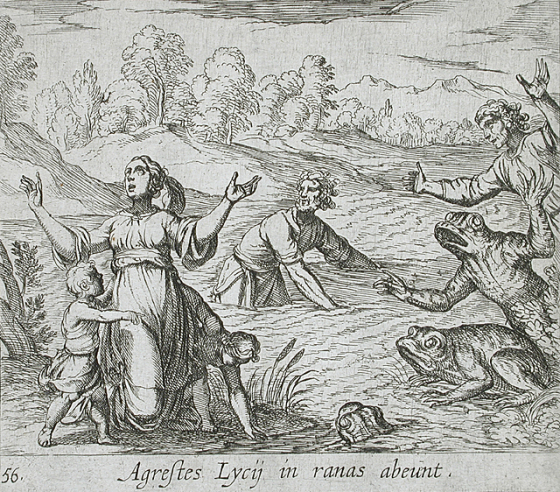The story of Latona and the Lycians
Now all men and women are indeed afraid of the anger manifested by divine being, and all pay more respect to the great power of the goddess, the mother of the twins. As often happens, because of recent events they tell old stories, and one says:
In Lycia’s fertile fields, in ancient times, also, the farmers spurned the goddess, and not without suffering for it. The thing is not well known, it is true, because the men were unknown, nevertheless, it was wonderful. I myself saw the place, and the lake made notable by the strangeness of it, since my father, getting old, and unable to endure the journey, had ordered me to collect some choice cattle from there, and one of the men of that country had offered himself as a guide. While I crossed the pastureland with him, there was an old altar, black with ashes, standing in the middle of a lake, surrounded by trembling reeds. My guide stopped and, shivering with fear, said in a murmur ‘Have mercy on me!’ and I, similarly, said in a murmur ‘Have mercy!’
Then I asked him whether it was an altar to the Naiads, Faunus, or a local god, and my friend replied:
Young man, it is no mountain spirit in this altar. She calls it hers, whom the queen of heaven once banned from the world, and whom vagrant Delos, a lightly floating island, would barely accept, at her prayer. There, between Pallas’s olive tree and a date-palm, Latona bore her twins, against their step-mother Juno’s will. Having endured her labour, even then she fled Juno, carrying the divine twins clasped to her breast.
Then, inside the borders of Lycia, home of the Chimaera, as the fierce sun scorched the fields, the goddess, weary from her long struggle, and parched by the radiant heat, felt her thirst: also her hungry children had drunk all her rich milk. By chance she saw a smallish lake in a deep valley. Countrymen were there, gathering bushy osiers, rushes, and the fine marsh sedges.
The Titan’s daughter approached, and putting her knee to the ground, rested, to enjoy a drink of the cool water. The group of rustics denied it to her.
The goddess, denied, spoke. ‘Why do you forbid me your waters? The use of water is everyone’s right. Nature has not made the sun, or the air, or the clear waves, private things. I come for a public gift, and yet I beg you to grant it to me as a suppliant. I was not preparing to bathe my limbs and my weary body here, only to quench my thirst. My mouth lacks moisture from speaking, my throat is dry, and there’s scarcely a path here for speech. A drink of water would be nectar to me, and I would bear witness to accepting life from it, as well: you will be giving life from your waves. Let these children move you, also, who stretch their little arms out from my breast.’
And it chanced that they did stretch out their arms. Who would not have been moved by the goddess’s winning words? Yet, despite her prayers they persisted in denying her, with threats, if she did not take herself off, and added insults besides. Not content with that, they also stirred the pool with their hands and feet, and churned up the soft mud from the depths, by leaping about, maliciously.
Anger forgot thirst, for now the daughter of Coeus could not bear to beg from the unworthy, nor speak in words inferior to those of a goddess, and stretching her palms to the heavens, she said ‘Live in that swamp for ever!’
It happened as the goddess wished: It is their delight to be under the water, now to submerge their bodies completely in the deep pool, now to show their heads, now to swim on the surface. Often they squat on the edges of the marsh, often retreat to the cool lake, but now as before they employ their ugly voices in quarrelling, and shamefully, even though they are under the water, from under the water they try out their abuse. Now their voices are also hoarse, their inflated throats are swollen, and their croaking distends their wide mouths. Their shoulders and heads meet, and their necks appear to have vanished. Their backs are green; their bellies, the largest part of their body, are white, and, as newly made frogs, they leap in their muddy pool.
Next: Marysas
(800 words)
